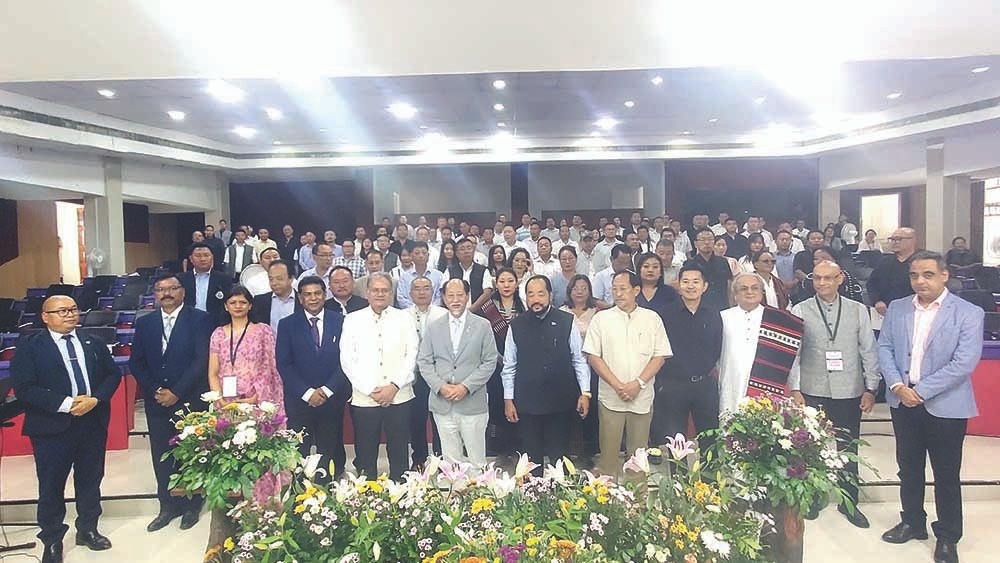EMPHASISES ON DISASTER-RESILIENT URBAN GOVERNANCE
State chief minister Dr. Neiphiu Rio made a strong reaffirmation of the state government’s “zero tolerance” policy on land encroachments, at the Urban and Local Resilience Training for elected members of Urban Local Bodies (ULBs) held at the Capital Convention Centre here Tuesday.
The chief minister, who is also the chairman of NSDMA, urged the ULBs across Nagaland to act decisively in enforcing safety regulations, promoting resilient urban development, and preventing man-made disasters through responsible governance.
Dr.Rio described the participants as the “first responders” and “warriors of our towns and wards”, while stressing that their actions were crucial in shielding communities from natural calamities.
The training was organised by the Nagaland State Disaster Management Authority (NSDMA), Home Department, in collaboration with the United Nations Office for Disaster Risk Reduction (UNDRR), the International Institute of Safety & Security Management (IISSM), and the Department of Urban Development and Municipal Affairs, Nagaland.
The chief minister further reminded that Nagaland’s urban centres were predominantly situated in geologically fragile regions, prone to earthquakes, landslides, and flooding.
He warned that recent incidents such as the devastating cloudburst and landslides at Pherima and floods in Dimapur, Chümoukedima, and Niuland, were recurring disasters that cannot be accepted as the new normal. Dr. Rio told councillors that as elected leaders, they occupy a critical space “where policy meets survival”. He said permits which they sign could determine whether communities thrive or structures collapse. He said even that a single signature on a building permit carried the potential to save or endanger a family’s future. He reminded that vigilance at the local level was the first defence against preventable disasters.
While emphasising on the importance of the State’s building bye-laws, Rio said all structures in Kohima and other hill towns must adhere strictly to Zone V earthquake safety codes. He also stressed that no structure should be approved without compliance with these standards. He also urged ULBs to insist on flood-resilient building designs in low-lying areas like Dimapur with raised plinths and proper stormwater drainage systems. Rio directed that illegal encroachments on riverbanks, drains, and unstable hillsides should be dealt with firmly.
Dr. Rio highlighted that a building permit has now become a covenant of public safety and that violation of that trust must carry consequences.
He directed that non-compliant structures be dealt with using a zero-compromise approach- issuance of stop-work orders where necessary, and buildings situated on flood channels or landslide-prone zones be demolished if required.
Besides strict enforcement, he also called upon ULBs to actively engage with their communities, promoting public awareness and encouraging collective responsibility in maintaining safe urban environments. Dr. Rio also highlighted that ULBs played a frontline role in monsoon preparedness and must ensure year-round readiness through proper coordination, planning, and infrastructure upkeep.
He advised ULBs to work in close coordination with District Disaster Management Authorities (DDMAs), the Police, Fire & Emergency Services, the Health Department, the Public Works Department (Roads & Buildings), and the Public Health Engineering Department (PHED).
On infrastructure, Dr. Rio asserted that drainage system management was the single most crucial preventive measure against urban flooding. He said all drains-major and minor-must be cleaned and desilted before the rains. Blockages caused by garbage, debris, vegetation, or encroachments must be cleared to ensure unimpeded water flow, he added.
He also stressed on the importance of intensified garbage collection and effective solid waste disposal to prevent clogging of drains during the rainy season.
To mitigate long-term risks, Rio called for comprehensive landslide risk mapping in collaboration with NSDMA or the Department of Geology and Mining. He directed ULBs to identify and mark vulnerable slopes near homes and roads, and to implement temporary safety measures such as boulder netting where feasible.
Dr. Rio reiterated that no infrastructure project should be approved without a proper soil test. He said that geo-technical investigations were essential, due to Nagaland’s complex and unstable geology and therefore, all building permits, particularly in high-risk zones like the NH-29 corridor, must be backed by a thorough soil stability reports.
He also maintained that ULB-led scrutiny should be initiated in every town and reminded members that the training included lessons on interpreting soil stability scores.
Further, the chief minister urged ULB leaders to understand the meaning of resilience and rise above administrative duties to become true protectors of Naga lives. He encouraged them to stand firm against corruption in construction practices, mobilise their khels, colonies, and wards, and make Nagaland a model state for mountain resilience in India.
While acknowledging the challenges posed by the terrain and limited resources, Dr. Rio noted that sustained effort, investment, and collaboration between ULBs, State agencies, and local communities were essential to building a resilient and sustainable Nagaland.
Later, the chief minister unveiled the Line Department Disaster Management Plan Preparation.
Earlier, short speeches were delivered by advisor NSDMA & NRE, Z Nyusietho Nyuthe, advisor Urban Development & Municipal Affairs Zhaleo Rio and Sanjaya Bhatia, head of Incheon UN Office for Disaster Risk Reduction (UNDRR).
The inaugural programme was chaired by Training & Education, NSDMA assistant manager Khrolou Koza Lohe, invocation was offered by Friday Gwatilo Alex Tep, secretary to the Bishop of Kohima.
Welcome address was delivered by home commissioner Anoop Khinchi, a brief introduction of the programme by NSDMA joint CEO Dr Johnny Ruangmei.
A special number was presented by Chele group while vote of thanks was proposed by Project & Resources, NSDMA assistant manager Thejangulie Zao.

